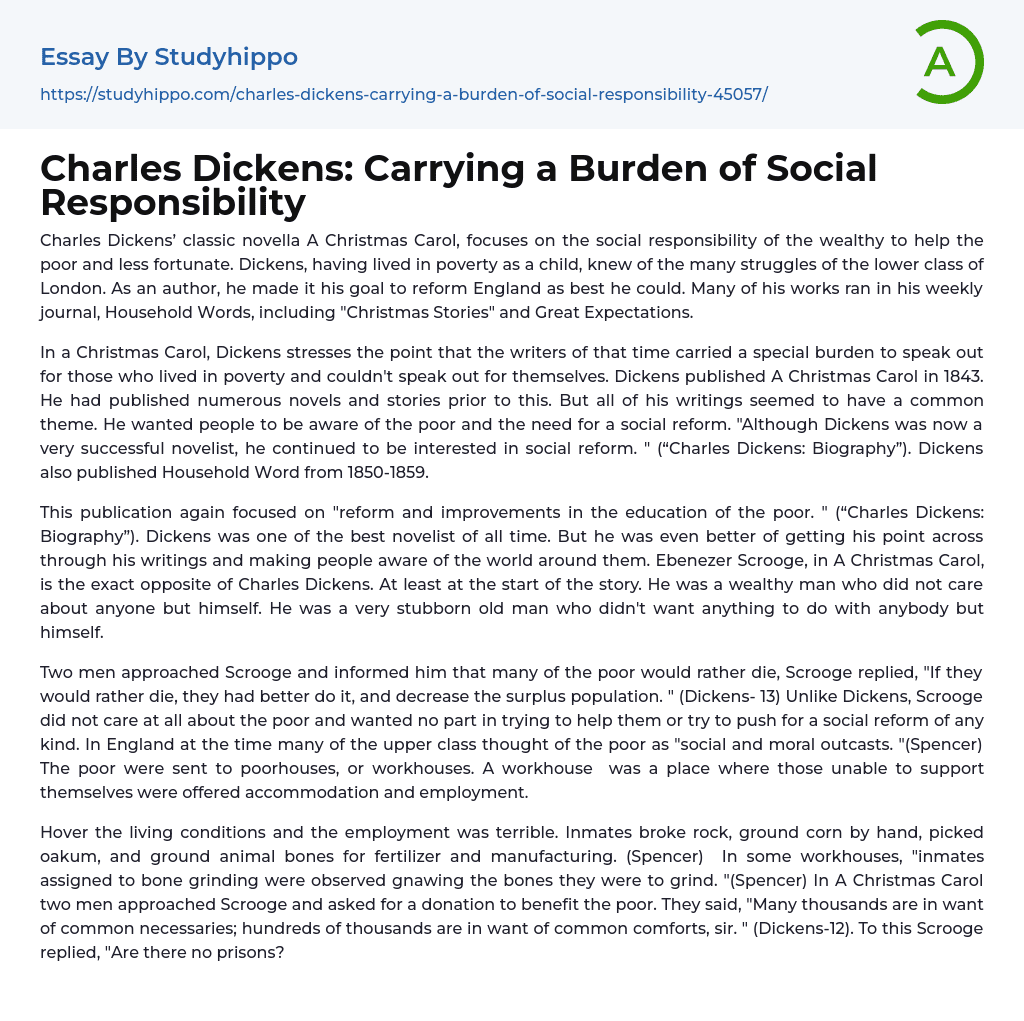

Charles Dickens: Carrying a Burden of Social Responsibility Essay Example
Charles Dickens’ classic novella A Christmas Carol, focuses on the social responsibility of the wealthy to help the poor and less fortunate. Dickens, having lived in poverty as a child, knew of the many struggles of the lower class of London. As an author, he made it his goal to reform England as best he could. Many of his works ran in his weekly journal, Household Words, including "Christmas Stories" and Great Expectations.
In a Christmas Carol, Dickens stresses the point that the writers of that time carried a special burden to speak out for those who lived in poverty and couldn't speak out for themselves. Dickens published A Christmas Carol in 1843. He had published numerous novels and stories prior to this. But all of his writings seemed to have a common theme. He want
...ed people to be aware of the poor and the need for a social reform. "Although Dickens was now a very successful novelist, he continued to be interested in social reform. " (“Charles Dickens: Biography”). Dickens also published Household Word from 1850-1859.
This publication again focused on "reform and improvements in the education of the poor. " (“Charles Dickens: Biography”). Dickens was one of the best novelist of all time. But he was even better of getting his point across through his writings and making people aware of the world around them. Ebenezer Scrooge, in A Christmas Carol, is the exact opposite of Charles Dickens. At least at the start of the story. He was a wealthy man who did not care about anyone but himself. He was a very stubborn old man who didn't want anything to do
with anybody but himself.
Two men approached Scrooge and informed him that many of the poor would rather die, Scrooge replied, "If they would rather die, they had better do it, and decrease the surplus population. " (Dickens- 13) Unlike Dickens, Scrooge did not care at all about the poor and wanted no part in trying to help them or try to push for a social reform of any kind. In England at the time many of the upper class thought of the poor as "social and moral outcasts. "(Spencer) The poor were sent to poorhouses, or workhouses. A workhouse was a place where those unable to support themselves were offered accommodation and employment.
Hover the living conditions and the employment was terrible. Inmates broke rock, ground corn by hand, picked oakum, and ground animal bones for fertilizer and manufacturing. (Spencer) In some workhouses, "inmates assigned to bone grinding were observed gnawing the bones they were to grind. "(Spencer) In A Christmas Carol two men approached Scrooge and asked for a donation to benefit the poor. They said, "Many thousands are in want of common necessaries; hundreds of thousands are in want of common comforts, sir. " (Dickens-12). To this Scrooge replied, "Are there no prisons?
- Overpopulation essays
- Homelessness essays
- Hunger essays
- Dumpster Diving essays
- Homelessness In America essays
- Aldous Huxley essays
- Alice Walker essays
- Amy tan essays
- Anne Bradstreet essays
- Anton Chekhov essays
- Arthur Miller essays
- Augustine essays
- Bertolt Brecht essays
- Booker T Washington essays
- Carol ann duffy essays
- Charles Dickens essays
- Charlotte Perkins Gilman essays
- Chinua Achebe essays
- Christina Rossetti essays
- Consider The Lobster essays
- Edgar Allan Poe essays
- Elizabeth Bishop essays
- Emily Dickinson essays
- Ernest Hemingway essays
- F. Scott Fitzgerald essays
- George Orwell essays
- Harper Lee essays
- Homer essays
- James Baldwin essays
- Jane Austen essays
- John Donne essays
- John Steinbeck essays
- Kate Chopin essays
- Kurt Vonnegut essays
- Langston Hughes essays
- Leonardo Da Vinci essays
- Mark Twain essays
- Mary Shelley essays
- Maya Angelou essays
- Nathaniel Hawthorne essays
- Oscar Wilde essays
- Percy Bysshe Shelley essays
- Peter Skrzynecki essays
- Phillis Wheatley essays
- Poets essays
- Ralph Waldo Emerson essays
- Ray Bradbury essays
- Richard Rodriguez essays
- Robert Browning essays
- Robert Frost essays



